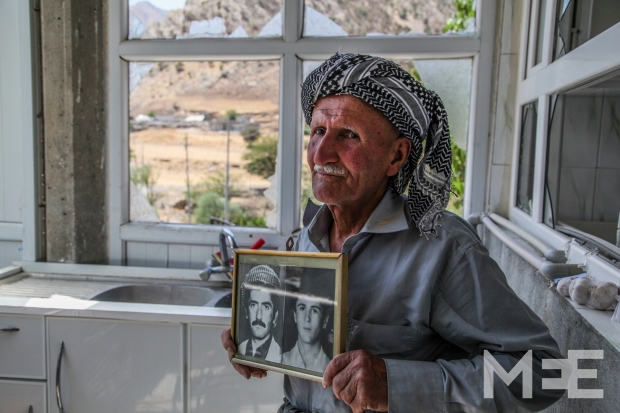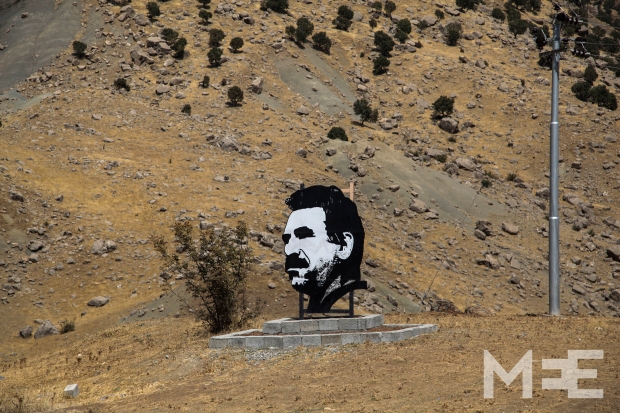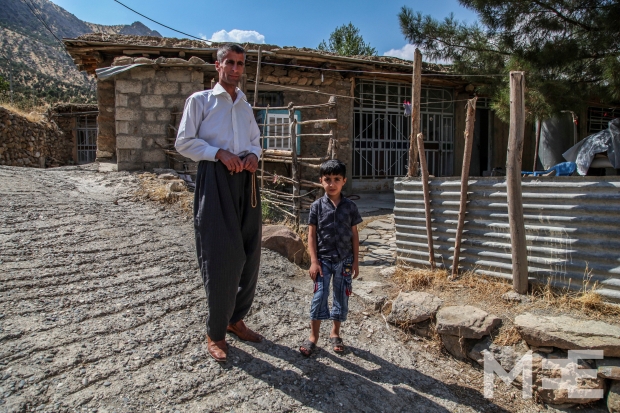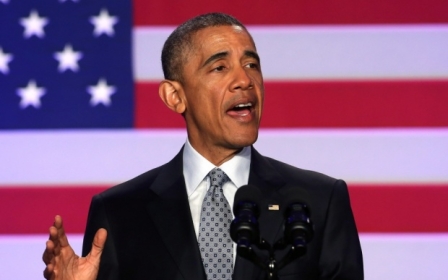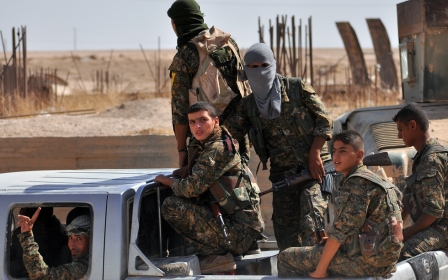Iraqi Kurdish civilians bear the brunt of Turkish airstrikes
KANDIL, Iraqi Kurdistan - Turkey continues to conduct airstrikes against the Kurdistan Workers Party (PKK) in spite of the unilateral ceasefire brought forth by the PKK. As the bombings go on, Turkey has scheduled critical elections less than three weeks away.
The announcement of the PKK’s ceasefire offer came immediately after the largest attack in Turkey’s modern history. On 10 October, two suicide bombers blew themselves up at a peace rally in Ankara, only five days after Turkey’s president Recep Tayyip Erdoğan met EU leaders in Brussels to discuss the situation of Syria's refugees. In return for keeping Syrian refugees from reaching Europe, Erdoğan is asking the EU to support his war on the PKK.
Civilians, however, have bared the brunt in this war. Most of the casualties have been non-combatants, and a significant portion of those killed never took up arms against Turkey, but instead fought the Islamic State (IS) group in Syria and Iraq.
Rania, a city in the Kandil Mountains that played a major role during the Kurdish uprising in 1991 against Saddam Hussein, has now become a site of conflict once again. Nevertheless, inhabitants of the Kandil Mountains try to lead a peaceful life on the countryside.
However, a simple life is oftentimes not what they get. Renas Rojhilat, the owner of a shop in the small town of Zergele, lost his son on the frontlines in the Syrian border town of Kobane 10 days ago.
“From the age of 15 he wished to join a militia, so he joined the YPG,” Rojhilat says. “The IS siege of Kobane was the final straw. I take great pride in him.”
The current conflict began in Kobane. IS besieged this Syrian-Kurdish city one year ago. It is one of the three cantons – Afrin, Kobane and Jazira – that are under the de facto control of the so-called “Autonomous Administration” led by the Syrian-Kurdish Democratic Union Party, which has close ties to the PKK. Turkey, like IS, always objected to the PKK building an autonomous region in northern Syria.
The Kurds accused Turkey of complicity during Kobane's siege. On 20 July, this fragile situation exploded. A Turkish adolescent blew himself up during an assembly of left-wing Turkish and Kurdish activists in Suruç. The PKK held Turkey responsible and, in retaliation, killed two Turkish police officers two days later. President Erdoğan retaliated by dropping bombs on the PKK in the Kandil Mountains.
Rojhilat, the shop owner, is not the sole inhabitant with offspring fighting IS. The sons of Aisha Ehmed joined the Peshmerga to free the Yazidis, a Kurdish religious minority, when their city Sinjar was overrun by IS.
An estimated 50,000 Yazidis fled to the mountains in August 2014. They were stranded, lacking water, food, shadow and medicines. After one week, the PKK, with the help of the Syrian-Kurdish militia YPG and the Iraqi-Kurdish Peshmerga, liberated 30,000 refugees. IS enslaved some 3,000 women. Over 500 men, women and children were killed.
'Flagrantly unlawful'
On 1 August, Aisha Ehmed was killed by Turkish air raids. Aisha’s home in Zergele was turned to rubble. Four houses were wiped away. Matresses, computers, washing machines, clothes and books lie mingled with debris. Amnesty International called the attack “flagrantly unlawful”.
Zergele’s 200 inhabitants fled to neighbouring villages. One such inhabitant is Abu Bakr Mahmoud. Even for someone in his 60s, he sprightfully strolls down the driveway of his ruined home.
“I will tell you everything,” he says, humping sacks. “I was about to start my morning prayer when a rain of glass splinters poured down on me. Some cows just dropped dead in the stable. The raid lasted from four to six in the morning. Missiles, one after the other. Three of my cousins were killed. In 1993, I already lost my son and brother in a Turkish airstrike.”
“Yes, they are here,” Abu Bakr says, pointing to PKK guards. “But we can’t simply chase them away, can we? They have become part of our society. Yes, Turkey is using this as a justification for their attacks. But without the PKK, they’d surely come up with another excuse.”
The PKK, which is designated as a terrorist group by Turkey, the EU and US, arrived in the Kandil Mountains in 1998. They had fought to achieve Kurdish independence from Turkey and set up training camps in Lebanon, but Syria closed them down and expelled their leader Abdullah Ocalan. As a consequence, the PKK built an autonomous enclave in the Kandil Mountains, including training camps, arms depots and communication centres.
As part of the peace treaty between Turkey and the PKK in 2013, a great number of PKK fighters retreated from Turkey, moving to the Kandil Mountains at the invitation of the government of the Kurdish region in Northern Iraq. The 61 villages, counting altogether 8,000 inhabitants, are governed by the Kandil Mountain Municipality, which belongs to an autonomous, decentralised administration following Ocalan’s model.
According to the Turkish authorities, Zergele housed a “terrorist camp” and the PKK used the inhabitants as “human shields”. Amnesty International researchers, however, did not come across any evidence of PKK arms immediately after the attack, neither did they encounter military positions nearby the village.
To avoid being a target of Turkish airstrikes, PKK fighters withdrew from their checkpoints. They hide in the mountains and move around in groups of three.
“In the 1990s, when the Peshmergas were fighting Saddam, this house was always packed with fighters coming to ask for food,” Abu Bakr says, smiling from ear to ear, baring his toothless mouth.
“But times have changed. Nowadays, PKK fighters have their own bases, where they cook themselves. I have no idea why our village has been bombed. What I do know, is that secret agents are here. Perhaps they informed Turkey that our village has a lot of fighters in the war against IS.”
Abu Bakr’s own son Mohamed is one of those fighters. “A few days ago I was fighting in the front line. We were conquering 10 villages of IS in Kirkuk province,” Mohamed says, serving tea.
The house where they found shelter in the nearby village of Bokriskan is a humble country cottage with a thatched roof. Mohamed’s little boy is sitting indifferently by the food, displayed on a plastic wrap on the ground.
“My brother was killed too. God will grant us justice,” Abu Bakr’s wife says. Abu Bakr had to drag her to the hiding place, as she was paralysed with fear. “Since the attack, her muscles have been strained in such a way that she still struggles to stand upright.”
Like the end of the world
A guide from Kandil municipality brings us to a burial place. Within a scope of a hundred metres all tree trunks are scorched and branches broken off. In the gravestones we discover holes of smashed-in shrapnel. The ground shows no marks of bomb craters, suggesting the use of cluster ammunition, which explodes in the air and sends hundreds of pieces of shrapnel flying in all directions. Hundred metres away, the windows of a school are smashed to pieces.
“Feel the weight of it,” the guide says. “This is shrapnel from the missiles. The impact was so overpowering that a barrel of oil and a gas canister were blown up tens of metres away.” The steel gas canister has been torn into two pieces, the second piece lying at a distance of a few metres.
Trees were reduced to powder and thick branches have been broken down. The walls of the houses that are still standing, including the village mosque, are speckled by flying shrapnel. On the inside, the houses are ruined.
“I had been saving money for three years to build this house, and we had only just moved in here,” Nabi Hassan says. Hassan has not been taking up arms against Turkey; he is a sergeant of the Kurdish Peshmerga forces that are fighting IS in Iraq.
The front door of his home has remained intact. Inside his house, however, a child’s bike with a crooked wheel lies on the ground and the glass of the shattered windows is scattered everywhere. A clock is lying on the floor, pointing at 4:10 am, the time when the first missiles landed on this little country village.
“Being asleep, we were suddenly woken up by an ear-shattering explosion”, Hassan says, standing on the roof of his house while he gazes at the village in ruins. “It seemed like the end of the world. A wounded man hobbled into my bathroom to take care of his wound. Here you see the drops of blood on the wall. He died shortly after. When we ran outside, we were surrounded by smoke and fire. Amidst the chaos people were running like headless chickens. And children were crying, everywhere.”
Hassan explains how a drone flew over and an aircraft fired another missile at the crowd of people who were searching for survivors beneath the ruins. “I saw mutilated bodies. Of civilians, our villagers. If you are looking for the PKK, they are hiding in the mountains. Saddam bombed the Kurds as well. He was a dictator. But Turkey pretends to be a democratic state that wants to become a member of the European Union.”
Paradise
The United States, who consider the Kurds allies, have turned a blind eye when it comes to the Turkish air raids, because Turkey allows them to make use of the Incirlik air base and Turkey claims to be participating in the bombing of IS.
“No, the US have not become my enemy”, Hassan says. “They didn’t order Turkey to attack the Kurds. Before the cameras the Americans are saying that Turkey has the right to defend itself, but that is just political talk. They are aware of the fact that the PKK will even try to liberate Sinjar and I know they will coordinate with the PKK. Furthermore, we have not forgotten that the Americans set us free from Saddam.”
The silence, the fruit trees and the tweeting birds: it is difficult to imagine hell broke loose here.
“Kandil is a paradise”, Mohamed Hassan, chairman of the Kandil Mountain Muncipality, says. “For that reason we have even worked out a policy of environmental protection. In Turkish air raids more animals are killed than humans. Rare animals, like the gazelle. Normally, we hand out fines up to 2000 dollars for the violation of our environmental rules.”
All of a sudden a car with PKK fighters rushes by at high speed. Somewhat further on, a PKK fighter stops us. “We have spotted Turkish airplanes,” he says. “For your own safety, please leave the area immediately.”
New MEE newsletter: Jerusalem Dispatch
Sign up to get the latest insights and analysis on Israel-Palestine, alongside Turkey Unpacked and other MEE newsletters
Middle East Eye delivers independent and unrivalled coverage and analysis of the Middle East, North Africa and beyond. To learn more about republishing this content and the associated fees, please fill out this form. More about MEE can be found here.


